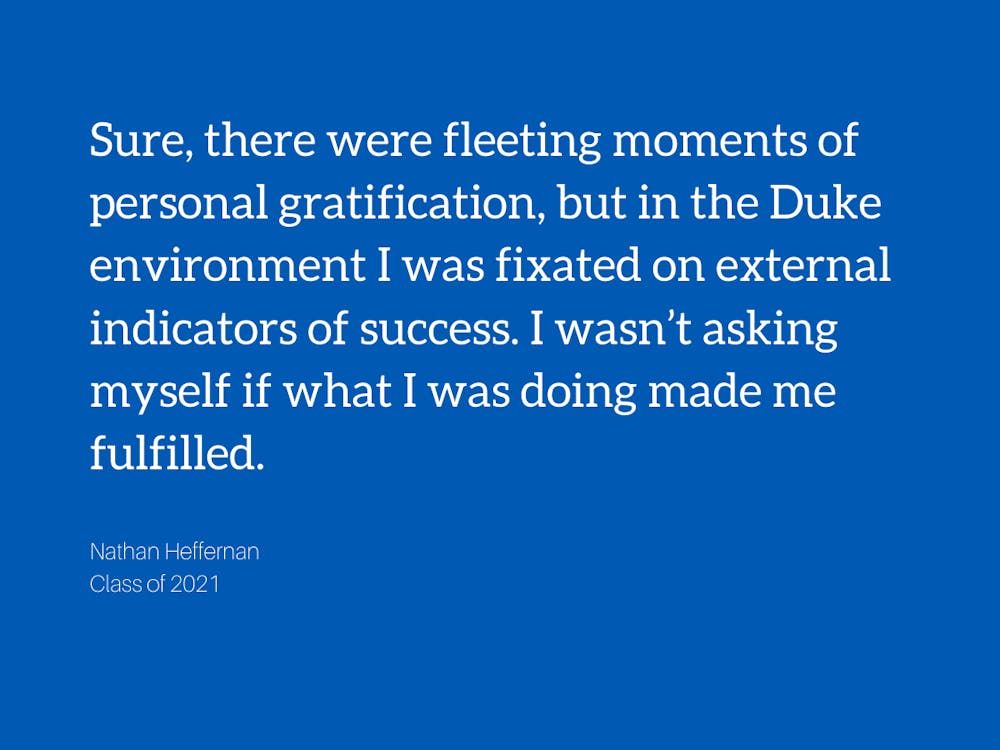I used to say that I “work best” in a high-stress environment. When asked about my future professional aspirations or my busy schedule, I would boast that I thrived when I was busy. Having things to do made me feel accomplished and happy. It was my justification for the impossible schedule I gave myself and the upkeep of that classic Duke effortless perfection. But it was an excuse I gave myself, which is made apparent in my present state. During social distancing, we are experiencing the stress of school without the feelings of occupation and purpose that usually come with it.
When I am unoccupied, I tend to fall into sadness and deep anxiety. I regularly have anxiety, but it is usually at what I consider a healthy level. A buzz in the background that’s always there, reminding me there’s always something coming, inventing problems to consume my next thoughts. Usually the cycle of college occupies the part of my mind that must always worry about something, tidying my worries in neat checklists to be completed. Without these tasks and business, my anxiety manifests itself in more serious ways. So I keep busy.
For a while, I took this issue to mean that I did best when I was occupied. I didn’t really interrogate what type of work made me happy, I only knew that I had to be working. I did things to manage my anxiety like working out and meditating as I had done for all my life. In my first years at Duke, I successfully made myself a well-oiled machine, held in homeostasis by the uppers and downers of self-care. That lifestyle is unsustainable.
The summer after sophomore year, I took a break from the Duke whirlwind. I had an amazing internship that I cared passionately about that was not stressful and confined to daytime hours. I didn’t feel the pressing anxiety I usually get on breaks, when I’m not distracted by school. And I didn’t feel the buzz of stress that hovers over me during school. The happiness and bliss I felt was long-lasting, and gave me a peace I had never felt. I was experiencing fulfillment without feeling stressed.
It seems obvious that fulfillment would improve my mental health and happiness. But previously, I had considered myself fulfilled in my daily life. I had confused constant stress with my own achievement and happiness. Sure, there were fleeting moments of personal gratification, but in the Duke environment I was fixated on external indicators of success. I wasn’t asking myself if what I was doing made me fulfilled.
I realized that I prefer a low-stress environment. And I think most of us do. But we often confuse feelings of hard work with fulfillment. The encouragements to keep ourselves busy, to prioritize work over home, to climb the ladder—are all stereotypes of the American condition. This glamorization of the workaholic lifestyle hurts everyone, but especially the working class, as the conditions they endure are justified with “hard work pays off” idealism. Enjoying life, paid vacation, parental leave to spend time with children: these are luxuries for the unmotivated.
In this era of social distancing, many of us are experiencing a low-activity high-stress environment. The countless social interactions and leisure activities we enjoy are now non-existent. For Duke students, we maintain the stress of our coursework without the resources and proximity to peers that made classes bearable. And every day we are bombarded with bad news.
In this time, we can look to what we miss most to understand what truly makes us thrive. I do not miss going to class, working everyday or having constant meetings. I deeply miss my friends, the BC plaza and every moment in between the chaos. In the absence of everything, it is easier to see the importance in what I took for granted.
As many of us Duke students have futures filled with high-stress professions and lives, I hope we don’t fall into the mindset that those environments are optimal, or even necessary. It is possible to contribute to society without harming yourself.
Nathan Heffernan is a Trinity junior. His column runs on alternate Mondays.
Get The Chronicle straight to your inbox
Signup for our weekly newsletter. Cancel at any time.

